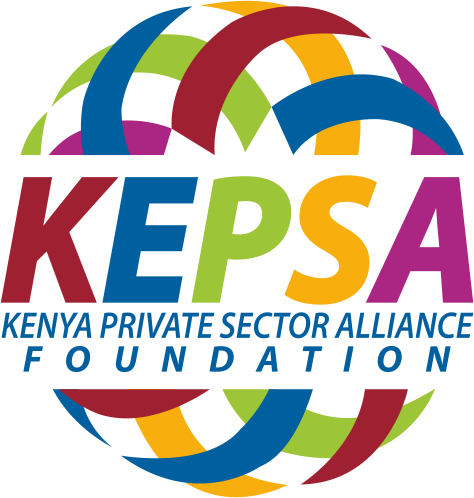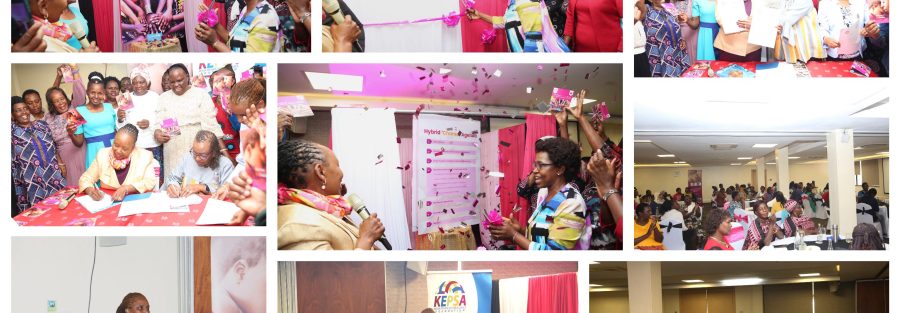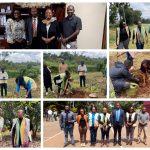On 20th June 2025, KEPSA Foundation officially launched the Hybrid ‘Chama’ Agenda under the Better Business Practices for Children (BBPC) initiative, implemented in partnership with UNICEF. The Hybrid ‘Chama’ Agenda is designed to guide women’s groups in incorporating essential topics on maternal and child health and nutrition into their regular monthly meetings. The overarching goal is to improve health and nutrition practices and outcomes by expanding networks and building a strong base of community champions dedicated to improving child welfare. The meeting was attended by over 100 women group leaders drawn from all 17 wards of Nairobi with a direct outreach of over 9000 women.
During the event, KEPSA Foundation Executive Director, Ms. Gloria Ndekei and and Echo Network Africa Foundation President and Chief Executive Officer Dr. Jeniffer Riria signed a Memorandum of Understanding aimed at strengthening collaborative efforts in advocating for women’s empowerment and advancing programs that support children’s welfare. This event marked a significant milestone in aligning both organizations’ missions toward inclusive community development.
In her remarks, Ms. Gloria Ndekei, Executive Director of KEPSA Foundation, provided an overview of the Foundation’s mandate, emphasizing its role in promoting socio-economic inclusion within the private sector. She underscored the importance of ensuring that vulnerable populations particularly women, children, and persons with disabilities are not left behind in development efforts, thereby contributing to a more inclusive and competitive business environment. Ms. Ndekei also reflected on the impactful journey of the BBPC initiative, acknowledging its milestones and achievements in advocating for the welfare of women and children within the private sector as a pathway to nurturing a healthier, more productive workforce.
Ms. Ndekei highlighted the pivotal role women play in shaping the nutrition and overall well-being of their children and families, noting that they are often the primary decision-makers when it comes to household diets. She emphasized that women’s groups ‘chamas’, provide a valuable platform for integrating key messages on nutrition and child welfare. While most ‘chamas’ meetings typically run for about two hours and focus mainly on savings and loan mobilization, she encouraged leaders to deliberately set aside at least 20 minutes during each session to discuss children’s nutrition, share information, and exchange practical tips. She noted that this kind of peer-to-peer learning could go a long way in fostering healthier families and more informed parenting.
Ms. Ndekei also stressed the importance of challenging and demystifying cultural beliefs that negatively impact children’s diets. She pointed out that in some communities, traditional norms discourage the consumption of highly nutritious foods such as eggs by children. Citing insights from a KEPSA Foundation survey, she observed that although many households have the means to provide adequate nutrition, entrenched cultural practices often hinder children from receiving the nourishment they need. She also emphasized the importance of education, noting that it lays the foundation for a better future for children. Ms. Ndekei highlighted the need to create safe and secure environments where children can thrive, both at home and in the community. Additionally, she underscored the value of good mentorship in shaping children’s character, building their confidence, and guiding them towards positive life choices.
While providing key remarks, Dr. Jeniffer Riria, President of Echo Network Africa Foundation, commended KEPSA Foundation for its outstanding work in advancing the welfare of women and children. She acknowledged the Foundation’s efforts in fostering inclusive development and community empowerment, particularly at the grassroots level. Drawing from her extensive advocacy experience spanning over 45 years, Dr. Riria shared her journey of working closely with women across Kenya, highlighting key milestones in the advancement of women’s rights. She reflected on the long journey in the fight for women’s rights, which has led to significant milestones, particularly in financial inclusion and women’s participation in decision-making processes. She emphasized the importance of being deliberate, informed, and bold in advocacy efforts, noting that meaningful and lasting change can only be achieved through intentional action and persistent engagement at all levels of society.
Dr. Jennifer Riria also delivered a special message on behalf of the Chief Justice of Kenya, Honorable Martha Koome, which emphasized the importance of championing the rights of children across the country. The message reaffirmed Kenya’s longstanding commitment to upholding children’s rights, as demonstrated by the country’s ratification of the Convention on the Rights of the Child in 1990. It further highlighted the progress made through the development of subsequent legal and policy frameworks aimed at protecting and advancing the rights and welfare of children in Kenya.
Dr. Riria noted that despite the existence of numerous laws and policies, many challenges remain. She expressed concern over the persistent issue of children not attending school, the lack of reliable data on out-of-school children, and the continued abandonment of children with disabilities who, in some communities, remain hidden and underserved. Dr. Riria stressed that these issues require urgent attention, and that the well-being of children must be prioritized.
Dr. Riria called upon women to take active role in advocating for adequate resource allocation for children’s education and welfare. She encouraged participation in public forums and decision-making spaces to amplify the voices of children and ensure their needs are addressed. She emphasized that women at the grassroots level have a special responsibility to report cases of children missing school, facing mistreatment, or living in vulnerable conditions. According to Dr. Riria, true national development cannot be achieved if the needs and rights of children are not intentionally addressed. She concluded her remarks by encouraging women to actively mentor, invest in, and protect the next generation, recognizing their critical role in shaping the future. She reaffirmed Echo Network Africa Foundation’s commitment to partnering with KEPSA Foundation in supporting and advancing the children’s agenda, emphasizing the power of collaboration in driving impactful and sustainable change for the well-being of children.
The Ministry of Health Director of Nutrition and Dietetic Services, Ms. Veronica Kirogo, officiated the launch of the Hybrid ‘Chama’ Agenda on behalf of the Principal Secretary for Public Health and Professional Standards, Ms. Mary Muthoni. In her remarks, she commended KEPSA Foundation, UNICEF, and their partners for their commitment to championing Better Business Practices for Children and for promoting the role of the private sector in improving public health outcomes. Ms. Kirogo emphasized that such collaborative efforts are vital in fostering sustainable, community-driven solutions that prioritize the health and well-being of children and their families.
Ms. Kirogo highlighted the growing concern of malnutrition in the country, noting that Kenya is currently facing a triple burden of malnutrition; undernutrition, obesity, and micronutrient deficiencies; all of which remain alarming. She pointed out that these challenges are largely driven by poor dietary practices, limited dietary diversity, and a general lack of awareness at both the household and community levels. Ms. Kirogo emphasized the urgent need for coordinated efforts to address these issues through education, behavior change, and strengthened community engagement. She thus recognized the critical role that chamas can play in addressing issues related to child nutrition and overall community well-being, given their strong grassroots presence and influence. She thus implored that the implementation of the Hybrid Chama Agenda would directly supports the Ministry’s efforts by embedding child and maternal health messages within structures that already exist, are trusted, and are led by women themselves as it will promote ownership, sustainability, and impact at the grassroots level.
While representing the Principal Secretary, State Department for Gender and Affirmative Action Ms. Halima Abdi, acknowledged the Ministry’s continued efforts in supporting women-led chamas through the Women Enterprise Fund (WEF). She emphasized the vital role played by grassroots champions in advancing development initiatives and recognized chamas as powerful platforms for community empowerment. Ms. Halima noted that to date, over 400 groups have been formed, reflecting the growing impact of these networks. She further highlighted the importance of nutrition as a critical component of family and child well-being, urging women to be vocal and proactive in addressing nutrition-related issues within their communities.
UNICEF Kenya Nutrition Specialist Ms. Laura Kiige highlighted emphasized the transformative power of chamas. She acknowledged that while Kenya has made notable progress in reducing malnutrition, challenges such as stunting persist. She further noted that these issues often stem from the lack of exclusive breastfeeding during the first six months of life, coupled with poor dietary practices, which contribute to nearly 30% of child malnutrition cases. Ms. Kiige emphasized that child nutrition poverty is not limited to low-income households but affects children across all socio-economic backgrounds, underscoring the need for widespread awareness and targeted interventions that cut across all segments of society. She underscored the importance of the private sector in promoting supportive workplace policies that encourage proper maternal and child nutrition. She further reiterated that chamas can play a critical role in addressing these challenges at the grassroots level by empowering women with knowledge and resources to improve child nutrition outcomes.
Ms. Jackie Malomba, the Founder of AfriWomen Connect, applauded the Foundation for spearheading such a commendable initiative. She urged participants to cascade the knowledge gained to other members of their chamas and emphasized the importance of integrating the children’s agenda into chama activities to ensure holistic community development.
Ms. Sarah Muhoya, Chief Party leader, Echo Network Africa Foundation concluded the meeting by outlining the proposed way forward, emphasizing the importance of enhancing accessibility and community engagement. She recommended translating the Hybrid Chama Agenda into Kiswahili and other local languages to ensure broader understanding among grassroots members. Additionally, she suggested leveraging local radio stations to amplify the Chama Agenda and reach wider audiences across the country. Ms. Muhoya also encouraged peer-to-peer training among chama members as an effective method of knowledge transfer and community empowerment Lastly, she recommenced digital access of the agenda for further ease of access.
The event held at Jacaranda Hotel, Nairobi brought together over 100 participants, including leaders of women’s groups, representatives from the private sector, Echo Network Africa Foundation, UNICEF, the Ministry of Health, and the Ministry of Gender, Culture and Children Services.
THE-HYBRID-CHAMA-AGENDA-BOOKLET.pdf





